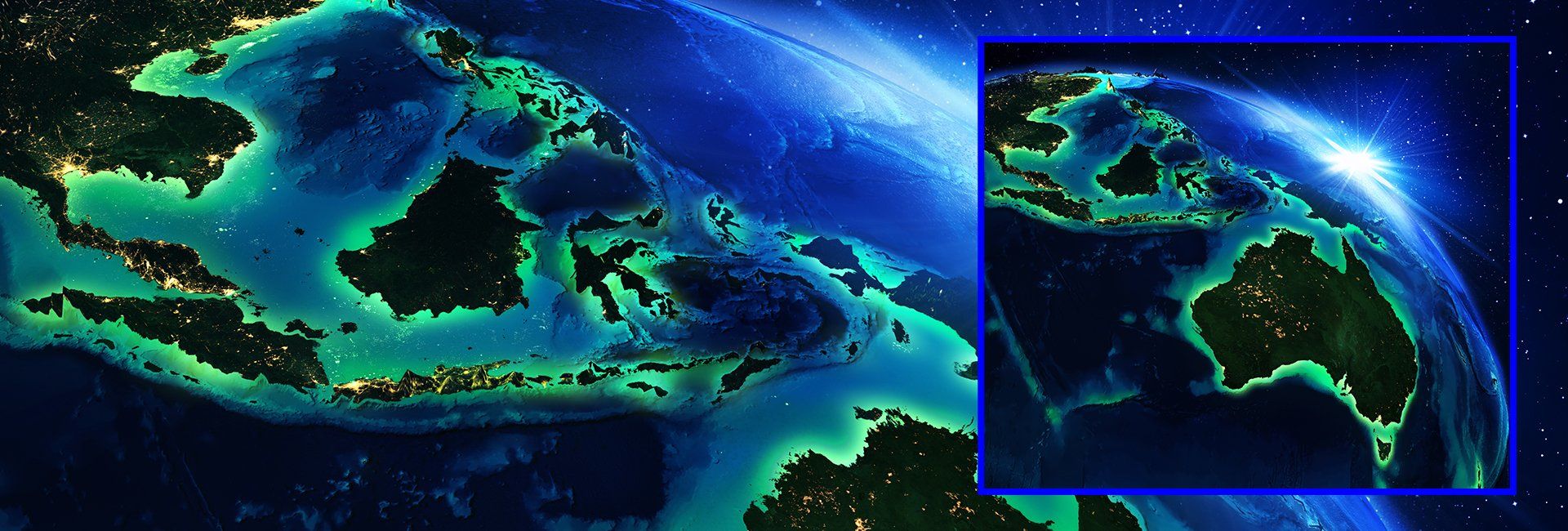ANALYSIS
The latest Australian Defence Strategic Review clearly outlines concerns about China and identifies the central role of the US alliance. At no point, does it mention Indonesia.
When China signed its security pact with Solomon Islands in March last year, Australia seemed to wake up to the fact that it had been taking its Pacific neighbours for granted. Coupled with a change in government, Australia has now shifted its focus.
Labor’s incoming Foreign Minister Penny Wong declared the former government had “dropped the ball” and has since committed to visiting all 17 Pacific Islands Forum members. Alongside this, Australia has recommitted to The Quad – the partnership between Australia, Japan, India, and the United States and, for better or worse, joined AUKUS (the US-UK-Australia defence pact). While the focus is on a newly assertive China and our engagement with key diplomatic and military ally, the United States, one key player in the region, Indonesia, has largely been forgotten.
Made up of more than 18,000 islands stretched over 1.9 million sq kms, the Indonesian archipelago lies between Australia and China – creating a geographic dynamic that the US or UK will never be able to rival.
Why is Indonesia, the world’s fourth most populous nation with one of the fastest growing economies, so often missing from Australia’s grand announcements on foreign and strategic defence policy? I asked three Southeast Asia and defence experts to look beyond the rigid dichotomy of the US-China struggle for power in the Indo-Pacific to better understand where Australia fits and whether we need to pay more attention to Indonesia.
'[We] think of Indonesia as big and close but poor and weak ... in future it is going to be big and close and rich and strong.'
Professor Hugh White, one of Australia’s most respected strategic defence minds, predicts our approach to Indonesia will have to change. “Our most important potential ally is going to be Indonesia,” said White, who is Emeritus Professor of Strategic Studies at ANU and the inaugural Director of the Australian Strategic Policy Institute.
The Australian Government’s Defence Strategic Review, released in April, outlines its concerns about China very clearly, stating “China’s assertion of sovereignty over the South China Sea threatens the global rules-based order in the Indo-Pacific in a way that adversely impacts Australia’s national interests”.
The review also identifies Australia’s alliance with the United States as central to our broader defence strategy, dedicating an entire section to our relationship. But at no point, does it mention Indonesia.
“We're very used to think of Indonesia as big and close, but poor and weak. But now and increasingly in future it is going to be big and close and rich and strong,” White said.
Professor Carlyle Thayer, a long-term Southeast Asia specialist with over 500 publications to his name, agrees that Indonesia is key.
“I think it's very difficult to separate what Australia can do without the US. At the same time, Indonesia is the most important country from economics, weight and where we're going with the relationship right now.
“We wouldn't want Indonesia to be insecure.”
Thayer, who is an Emeritus Professor of Politics at UNSW and director of Thayer Consultancy, argues that not just militarily, but economically, regardless of the scale of conflict in the region, our shipping routes and sea-lines through Indonesia are crucial.
“You know, you're looking at a map showing the shipping routes from Australia north, they're gonna go right through Indonesia and then up.”
“So, it's damage. Not kinetic damage, but economic damage,” explains Thayer, referring to the financial impact of redirected shipping lanes to and from Australia.
Where Australia's future lies
Indonesian-born scholar Aristyo Rizka Darmawan points out Australia’s future is not with United Kingdom. “The most important country for Australia in the next 100 years is not the UK anymore, but Indonesia and South-east Asia,” said Aristyo, who is a PhD scholar at the College of Asia and the Pacific at ANU. “But I think there's a lot of challenge in that.”
Australia is walking a fine contradictory line. On one hand, we’re economically and culturally deepening our relationship with Asia. On the other, we’re seemingly returning to the old imperial ties of the UK and US.
“Everyone says Australia and Indonesia are very important countries, bilaterally are important, but if we see, for example, the number of economic relations is not very much satisfactory, right? We still have very low export and import by trade,” Aristyo said.
“So indeed, the political commitment is there, but to really bring the meat and the ideas, I think we have a lot of things that we should working on.”
In June, Australian Prime Minister Anthony Albanese hosted Indonesia’s President Joko Widodo, using the opportunity to announce Australia would ease visa rules for Indonesians and that the two nations had signed a lithium-nickel trade deal.
Speaking of the former Coalition government’s tenure, Aristyo said “compared to Scott Morrison it’s much better now”, however, relatively, Australia’s level of trade with one of its closest neighbours is still too low.
“On a lot of occasions officials say like Australia, it's very important for Indonesia and Indonesia for Australia is very important. But when we see the facts, I think it's not really satisfactory.”
Indonesia does not want to see tensions between the United States and China escalate. Some in Indonesia fear that AUKUS could provoke such an escalation. Earlier this year, an unnamed senior Indonesian official reportedly said “AUKUS was created for fighting” and that Indonesian waters should not be used by Australian nuclear-propelled submarines. This stance has seemingly softened since, but concerns about Australia’s AUKUS pact, in particular its ties to the US prevail.
Those concerns are not only on the Indonesian side. “You can criticise AUKUS in two different ways,” said White. “You could say it's a really dumb way to buy submarines. The other is that it's a dumb approach to China's challenge.”
White argues our political leaders believe “the right way to respond to China's challenge is to just do whatever it takes to support American primacy.”
“My argument to that is that's a dumb thing to do, not because the outcome is not what we want, but because it's not going to work. Because I don't think America has the strength or the resolve to successfully push back against a rival as powerful as China in this part of the world.”
Aristyo said Indonesia “has always been uncomfortable traditionally, historically, with the major power presence in the regions.
“Australia, in the in the past few years, I think sees itself as part of the region, as part of like South-east Asia. But I think with the recent AUKUS, it turns out that Australia still lean their security towards their old allies,” Aristyo said. “It's very much also influenced how Indonesia think about Australia.”
“And of course, with increasing Indo-Pacific geopolitical conversations, it is undoubted that we see all major power sit here in Southeast Asia. You see how China’s involvement increasing in the regions, how the US also want to counter.
“We don't want to be driven only by the agenda of the major power of China, of the US,” said Arystio, arguing Indonesia should “set the agenda.”
Rethinking neutrality
At present, Indonesia is the great unknown at the intersection of the Indo-Pacific regions. Thus far, it has held a position of neutrality between the US and China, declaring that if an arms race occurs in the Pacific, it will not take up arms. But that doesn’t mean it does not have a leg in the race.
The Lowy Institute’s 2023 Asia Power Index Report ranked Indonesia as having the ninth largest military capability in Asia – Australia is ranked seventh. They also declared “South-east Asia is more dynamic than ever, with new indicators revealing Indonesia to be among the region’s most active diplomatic players”.
The presidential election in Indonesia early next year could see a rethink on the country’s neutrality. “It might affect how we view the US and China rivalry,” Aristyo said.
The three main contenders — Ganjar Pranowo, the Governor of Central Java; Anies Baswedan, a former Governor of Jakarta; and Prabowo Subianto, a former Special Forces Commando — take very different views of the China-US struggle for regional supremacy.
Aristyo explained many in Indonesia believe Pranowo is more likely to lean towards China, Baswedan more likely to favour the US and Subianto is more likely to want to remain neutral.
“A lot of folks say that Jokowi (Widodo) is more leaning towards China. And Anies (Baswedan) is going to be the opposite of Jokowi. So, he will bring Indonesia more towards the US and Western world,” Aristyo said.
Regardless of who wins, Aristyo believes Indonesia’s relationship with Australia should still be a priority.
“In terms of Australia, of course, there's no options. As a neighbour, [Indonesia] should keep our relationship in a good shape, and I think that the notion of trust should be very important.”
Australia’s focus needs to be on the Indo-Pacific, its growing economy, the existential threat posed by climate change to Pacific neighbours. It needs to focus on Indonesia.
“We've never faced an Asian power as powerful as China,” said White, who has analysed Australia’s strategic defences for more the three decades. “But we've also never faced a close neighbour as powerful as Indonesia is today. Let alone what it will be in years to come.”
Maddie is a journalist, podcast presenter and playwright. She completed her Master of Journalism and Communication degree at the University of New South Wales with a High Distinction and was awarded positions on the Faculty of Arts, Design & Architecture Dean's List in 2022 and 2023. As a playwright she has written for Queensland Theatre, La Boite Theatre Company, Dead Puppet Society and Screen Queensland, and has directed for La Boite Theatre Company and The Good Room.






